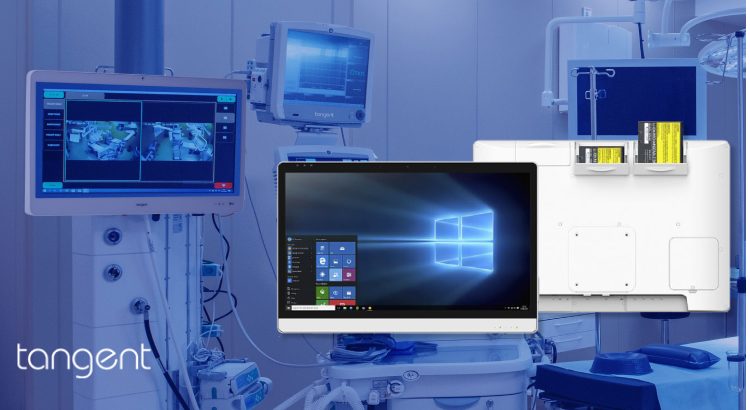The integration of cutting-edge tools is not just a convenience—it’s a necessity. Among these innovations, Medical PCs are becoming indispensable assets in hospitals, clinics, and healthcare facilities. But what exactly is a Medical PC, and why should healthcare providers be paying attention?

What is a Medical PC?
A Medical PC is a specialized computer designed specifically for use in healthcare environments. Unlike standard commercial computers, Medical PCs are purpose-built to meet the stringent requirements of medical settings, including compliance with safety standards like EN 60601-1 for electrical safety in medical environments. They are built to handle the unique demands of healthcare workflows—streamlining operations, ensuring patient safety, and enhancing diagnostic accuracy.
But let’s dig deeper. What sets a Medical PC apart from the typical workstation? And why is it essential for healthcare professionals to consider investing in one?
Why Choose a Medical PC Over a Standard Computer?

Sterilization and Hygiene:
In healthcare, cleanliness is paramount. Medical PCs are designed with sealed, fanless enclosures that prevent the accumulation of dust and germs, making them easy to clean and disinfect. This is crucial for maintaining a sterile environment and minimizing the risk of infection, particularly in operating rooms or patient care areas.

Compliance with Medical Standards:
Standard PCs don’t meet the rigorous safety and performance standards required in healthcare settings. Medical PCs comply with regulations like IEC/UL 60601-1, ensuring that they do not interfere with medical equipment and are safe for use around patients.

Long-Term Reliability and Durability:
Healthcare providers need computers that can handle long shifts, multiple users, and intensive applications. Medical PCs are designed for durability, often equipped with industrial-grade components that can endure the high-pressure environment of hospitals, where downtime is not an option.

Enhanced Security:
With growing concerns about patient privacy and data breaches, Medical PCs often come with enhanced security features such as biometric login, encrypted storage, and support for advanced cybersecurity protocols. This ensures compliance with HIPAA and other regulatory frameworks protecting patient information.

Touchscreen Usability:
Many Medical PCs come equipped with touchscreen functionality, allowing healthcare providers to input and access patient information quickly and efficiently, even while wearing gloves. This improves workflow efficiency and reduces errors in high-stakes environments
How Medical PCs are Revolutionizing Healthcare

1. Improving Diagnostics and Imaging:
Medical PCs are often used to power diagnostic tools and medical imaging software. These computers are engineered to handle high-resolution images for applications like X-rays, MRIs, and ultrasounds, ensuring that healthcare professionals have the most accurate and detailed images possible. With faster processing times and improved display quality, medical PCs contribute to more accurate diagnoses and treatment plans.

2. Streamlining Patient Records:
Gone are the days of cumbersome paper charts. Medical PCs play a vital role in Electronic Health Record (EHR) management, allowing healthcare providers to access and update patient data in real-time. This means faster, more informed decisions and better overall patient care. Medical PCs are also essential for integrating different software solutions like telemedicine platforms, which are becoming increasingly critical in a post-pandemic world.

3. Telemedicine and Remote Care:
Speaking of telemedicine, Medical PCs are optimized for video consultations, helping healthcare providers offer remote services to patients who may not be able to visit the clinic. The COVID-19 pandemic accelerated the adoption of telehealth, and with Medical PCs, doctors can deliver high-quality care from virtually anywhere, ensuring patients still receive the attention they need.

4. Supporting Medical Research:
Medical PCs are also crucial in research settings. With powerful processors and ample storage, they allow researchers to run complex simulations, analyze large datasets, and collaborate on groundbreaking studies. This speeds up the pace of innovation, from drug discovery to advanced surgical techniques.
What to Look for in a Medical PC
When shopping for a Medical PC, consider the following features:
- Medical-Grade Certifications: Ensure the PC complies with EN/IEC 60601-1 standards.
- Antimicrobial Coating: This extra layer of protection can help prevent the spread of bacteria.
- High-Resolution Displays: For diagnostic accuracy, especially if the PC will be used for medical imaging.

- Powerful Processing: Healthcare applications demand fast and reliable performance, so opt for PCs with top-tier CPUs and memory.
- Fanless Design: This reduces noise and contamination risks in sterile environments.
- Touchscreen Functionality: Consider a medical-grade touchscreen for better ease of use.
Future-Proofing Your Healthcare Practice
Investing in a Medical PC is not just about meeting today’s demands but future-proofing your practice. With healthcare becoming increasingly digitized, the right technology infrastructure ensures you stay ahead of the curve. Medical PCs are not just computers; they are critical tools that can improve patient outcomes, enhance workflow efficiency, and secure sensitive data.

Whether you’re upgrading your current systems or setting up a new healthcare facility, choosing a Medical PC is a smart decision that will yield long-term benefits. These purpose-built machines are revolutionizing how healthcare is delivered—ensuring better patient care, enhanced diagnostics, and seamless data management. Don’t let outdated technology slow you down. It’s time to embrace the future with a Medical PC.
By integrating Medical PCs into your practice, you can not only enhance the quality of care but also set your facility up for success in an increasingly competitive and tech-driven healthcare landscape.
Ready to upgrade to a Medical PC? Contact us today to find the best medical-grade computers for your practice!

Call Us: 1 800 342 9388
Live Chat : Here (6:30am-3:30pm PST)
Email: [email protected]
